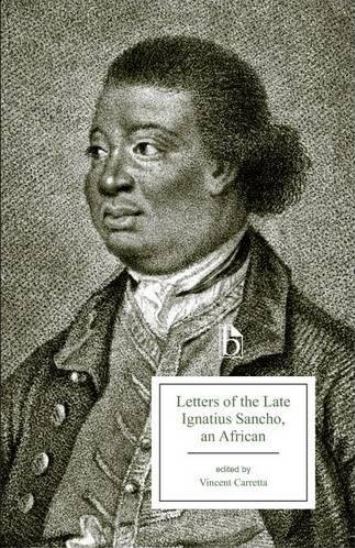Joseph Jekyll's Life of Ignatius Sancho
This biography of Ignatius Sancho was written by Joseph Jekyll in 1782 and has prefaced every edition of The Letters of the Late Ignatius Sancho to be published to date. In 1782 Jekyll was an unknown young man. Perhaps for this reason the biography is unattributed in the earlier editions. He later became a well known Whig politician and lawyer and to reflect this his authorship of the biography is acknowledged in the 1803 edition. Sancho's son, William, added a long footnote to this biography in the 1803 edition. I have not reproduced it here but it can be seen in the Edwards and Rewt (1994) edition.
The major problem with Jekyll's Life of Ignatius Sancho is that much of it is unverifiable, and, worse still, much of it directly contradicts what Sancho himself says to people in his letters. For example, although Jekyll tells us that Sancho was born on a slave ship, Sancho himself seems convinced that he was born in Africa. For a more detailed reading of Jekyll's Life of Ignatius Sancho, see my article '"The extraordinary Negro": Ignatius Sancho, Joseph Jekyll, and the Problem of Biography', originally published in The British Journal for Eighteenth-Century Studies in 2003, that shows that Sancho was almost certainly not born on a slave ship. (PDF, 1.6mb)
Whether or not it is an accurate account, I have tried to reproduce Jekyll's Life of Ignatius Sancho faithfully. Spellings are exactly as Jekyll intended them to be, even though they sometimes look rather odd to modern eyes. Similarly, the divisions and lines drawn on your screen are intended to reflect, though not reproduce, the appearance of the original text.
The Life of Ignatius Sancho
Quamvis ille niger, quamvis tu effes. VIRGIL
The extraordinary Negro, whose Life I am about to write, was born A.D. 1729, on board a ship in the Slave-trade, a few days after it had quitted the coast of Guinea for the Spanish West-Indies, and at Carthagena, he received from the hand of the Bishop, Baptism, and the name of Ignatius.
A disease of the new climate put an early period to his mother's existence; and his father defeated the miseries of slavery by an act of suicide.
At little more than two years old, his master brought him to England, and gave him to three maiden sisters, resident at Greenwich; whose prejudices had unhappily taught them, that African ignorance was the only security for his obedience, and that to enlarge the mind of their slave would go near to emancipate his person. The petulance of their disposition surnamed him Sancho, from a fancied resemblance to the 'Squire of Don Quixote.
But a patron was at hand, whom Ignatius Sancho had merit enough to conciliate at a very early age.
The late Duke of Montagu lived on Blackheath: he accidentally saw the little Negro, and admired in him a native frankness of manner as yet unbroken by servitude, and unrefined by education - he brought him frequently home to the Duchess, indulged his turn for reading with presents of books, and strongly recommended to his mistresses the duty of cultivating a genius of such apparent fertility.
His mistresses, however, were inflexible, and even threatened on angry occasions to return Ignatius Sancho to his African slavery, The love of freedom had increased with years, and began to beat high in his bosom. - Indignation, and the dread of constant reproach arising from the detection of an amour, infinitely criminal in the eyes of three Maiden Ladies, finally determined him to abandon the family.
His noble patron was recently dead. - Ignatius flew to the Duchess for protection, who dismissed him with reproof. - He retired from her presence in a state of despondency and stupefaction.
Enamoured still of that liberty, the scope of whose enjoyment was now limited to his last five shillings, and resolute to maintain it with life, he procured an old pistol for purposes which his father's example had suggested as familiar, and had sanctified as hereditary.
In this frame of mind the futility of remonstrance was obvious. The Duchess secretly admired his character; and at length consented to admit him into her houshold, where he remained as butler till her death, when he found himself, by her Grace's bequest and his own œconomy, possessed of seventy pounds in money, and an annuity of thirty.
Freedom, riches, and leisure, naturally led a disposition of African texture into indulgences; and that which dissipated the mind of Ignatius completely drained the purse. In his attachment to women, he displayed a profuseness which not unusually characterizes the excess of the passion. - Cards had formerly seduced him, but an unsuccessful contest at cribbage with a Jew, who won his cloaths, had determined him to abjure the propensity which appears to be innate among his countrymen. - A French writer relates, that in the kingdoms of Ardrah, Whydah, and Benin, a Negro will stake at play his fortune, his children, and his liberty. Ignatius loved the theatre to such a point of enthusiasm, that his last shilling went to Drury-Lane, on Mr. Garrick's representation of Richard. - He had been even induced to consider the stage as a resource in the hour of adversity, and his complexion suggested an offer to the manager of attempting Othello and Oroonoko; but a defective and incorrigible articulation rendered it abortive.
He turned his mind once more to service, and was retained a few months by the Chaplain at Montagu-house. That roof had ever been auspicious to him; and the present Duke soon placed him about his person, where habitual regularity of life led him to think of a matrimonial connexion, and he formed one accordingly with a very deserving young woman of West-Indian origin.
Towards the close of the year 1773, repeated attacks of the gout and a constitutional corpulence rendered him incapable of farther attendance in the Duke's family.
At this crisis, the munificence which had protected him through various vicissitudes did not fail to exert itself; with the result of his own frugality, it enabled him and his wife to settle themselves in a shop of grocery, where mutual and rigid industry decently maintained a numerous family of children, and where a life of domestic virtue engaged private patronage, and merited public imitation.
In December, 1780, a series of complicated disorders destroyed him.
Of a Negro, a Butler, and a Grocer, there are but slender anecdotes to animate the page of the biographer; but it has been held necessary to give some sketch of the very singular man whose letters, with all their imperfections on their head, are now offered to the public.
The display these writings exhibit of epistolary talent, of rapid and just conception, of wild patriotism, and of universal philanthropy, may well apologize for the protection of the great, and the friendship of the literary.
The late Duchesses of Queensberry and Northumberland pressed forward to serve the author of them. The former intrusted to his reformation a very unworthy favourite of his own complexion. - Garrick and Sterne were well acquainted with Ignatius Sancho.
A commerce with the Muses was supported amid the trivial and momentary interruptions of a shop; the Poets were studied, and even imitated with some success; - two pieces were constructed for the stage; - the Theory of Music was discussed, published, and dedicated to the Princess Royal; - and Painting was so much within the circle of Ignatius Sancho's judgement and criticism, that Mortimer came often to consult him.
Such was the man whose species philosophers and anatomists have endeavoured to degrade as a deterioration of the human; and such was a man whom Fuller, with a benevolence and quaintness of phrase peculiarly his own, accounteth "God's Image, though cut in Ebony." To the harsh definition of the naturalist, oppressions political and legislative have been added; and such are hourly aggravated towards this unhappy race of men by vulgar prejudice and popular insult. To combat these on commercial principles, has been the labour of Labat, Ferman, and Bennezet - such an effort here would be an impertinent digression.
Of those who have speculatively visited and described the slave-coast, there are not wanting some who extol the mental abilities of the natives. D'Elbée, Moore, and Bosman, speak highly of their mechanical powers and indefatigable industry. Desmarchais does not scruple to affirm, that their ingenuity rivals the Chinese.
He who could penetrate the interior of Africa, might not improbably discover negro arts and polity, which could bear little analogy to the ignorance and grossness of slaves in the sugar-islands, expatriated in infancy, and brutalized under the whip and the task-master.
And he who surveys the extent of intellect to which Ignatius Sancho had attained by self-education, will perhaps conclude, that the perfection of the reasoning faculties does not depend on a peculiar conformation of the scull or the colour of a common integument, in defiance of that wild opinion, "which," says a learned writer of these times, "restrains the operations of the mind to particular regions, and supposes that a luckless mortal may be born in a degree of latitude too high or too low for wisdom or for wit."
About this extract
Joseph Jekyll's Life of Ignatius Sancho first appeared in The Letters of the Late Ignatius Sancho, an African, published in 1782.
Sancho's Letters was published in five different editions between 1782 and 1803 before going out of print until the 1960s. The book is now available in several editions, including a paperback edition with notes and an introduction, edited by Vincent Carretta and available from:




